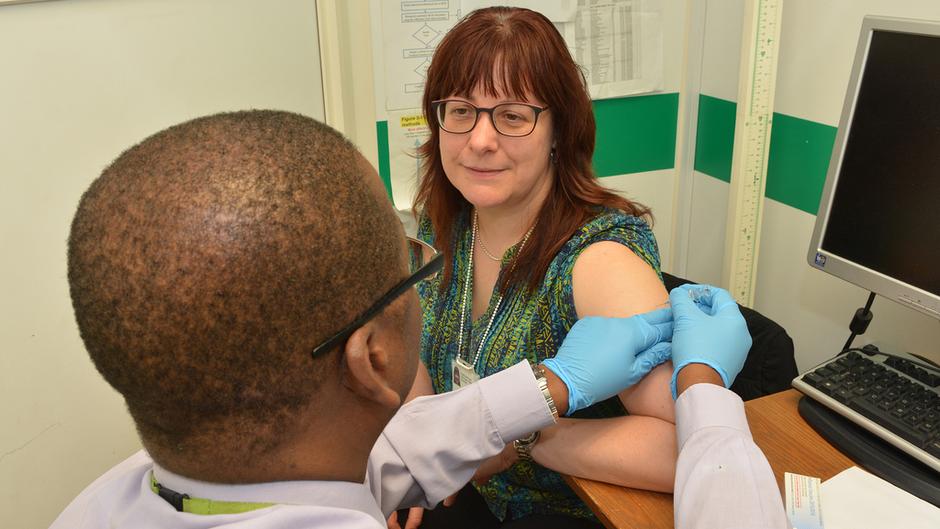Health, social care and hospice staff are eligible for free flu vaccination
Fri 7th December 2018
East Riding of Yorkshire Council’s public health team is urging health and social care and hospice staff to get the free flu vaccine available now from their general practice surgery or community pharmacy, or their employer for frontline healthcare workers.
Mike McDermott, associate director of Public Health at East Riding of Yorkshire Council, said: “The more people who are vaccinated, the lower the likelihood and spread of infection, reducing pressure on the NHS and Social Care during winter months.”
For 2018/19, free flu jabs are available for health and social care and hospice staff who are directly involved in the care of vulnerable people to protect both themselves and the people they look after. Vulnerable people include those with a serious long-term medical condition or who are aged 65 years and over.
Free flu jabs are also available for people aged 65 and over, people aged from six months to less than 65 years of age with a long-term health condition, pregnant women, children aged from two to four years, people in long-stay residential care homes, and carers.
A long-term health condition includes:
- chronic (long-term) respiratory disease, such as severe asthma, chronic obstructive pulmonary disease (COPD) or bronchitis
- chronic heart disease, such as heart failure
- chronic kidney disease at stage three, four or five
- chronic liver disease
- chronic neurological disease, such as Parkinson’s disease or motor neurone disease, or learning disability
- diabetes
- splenic dysfunction
- a weakened immune system due to disease (such as HIV/AIDS) or treatment (such as cancer treatment)
- morbidly obese (defined as BMI (Body Mass Index) of 40 and above).
The flu jab is available free from general practice surgeries and pharmacies for people in the at-risk groups, and through a school-based programme for children aged 4-9 years.
Flu occurs every year, usually in the winter, which is why it’s sometimes called seasonal flu.
It’s a highly infectious disease with symptoms that come on very quickly. Colds are much less serious and usually start gradually with a stuffy or runny nose and a sore throat. A bad bout of flu can be much worse than a heavy cold.
The most common symptoms of flu are fever, chills, headache, aches and pains in the joints and muscles, and extreme tiredness. Healthy individuals usually recover within two to seven days.
In line with the government’s ‘Catch it. Bin it. Kill it.’ campaign, residents are being encouraged to carry tissues and use them to catch coughs or sneezes, then to bin the tissues and to kill the germs by washing our hands.
Adults that go to work with symptoms of flu risk spreading it to their work colleagues and clients they may interact with.
Mike continued: “Flu is dangerous, highly contagious and largely preventable.
“For most people who catch flu it is unpleasant, but for some it can lead to chest infections, severe complications and even death.”
When an infected person coughs or sneezes, they spread the flu virus in tiny droplets of saliva over a wide area. These droplets can then be breathed in by other people or they can be picked up by touching surfaces where the droplets have landed.
You can prevent the spread of the virus by covering your mouth and nose when you cough or sneeze, and you can wash your hands frequently or use hand gels to reduce the risk of picking up the virus.
Mike added: “The best way to avoid catching and spreading flu is by having the vaccination, especially those at high risk.
“Don’t be put off getting the flu vaccination. If you are eligible get it now, it’s free because you need it.
“If you have a long-term health condition, even one that is well managed, have a BMI of 40 or over or are pregnant, you are at greater risk of severe complications if you catch flu.
“The nasal spray vaccination is a quick, painless and effective way for children aged two to nine to be protected from flu without the need for injections.”
Paula South, director of quality and integrated governance/executive nurse for East Riding of Yorkshire CCG, said: “Flu is extremely infectious and can lead to more serious health conditions.
“I would encourage anybody who is involved in caring for patients to consider getting their flu jab; protecting not only yourself, but also those more vulnerable from the potentially deadly effects of flu.”
Details of flu clinic times are available from individual GP practices. For more information about who should have a flu jab, visitwww.nhs.uk

